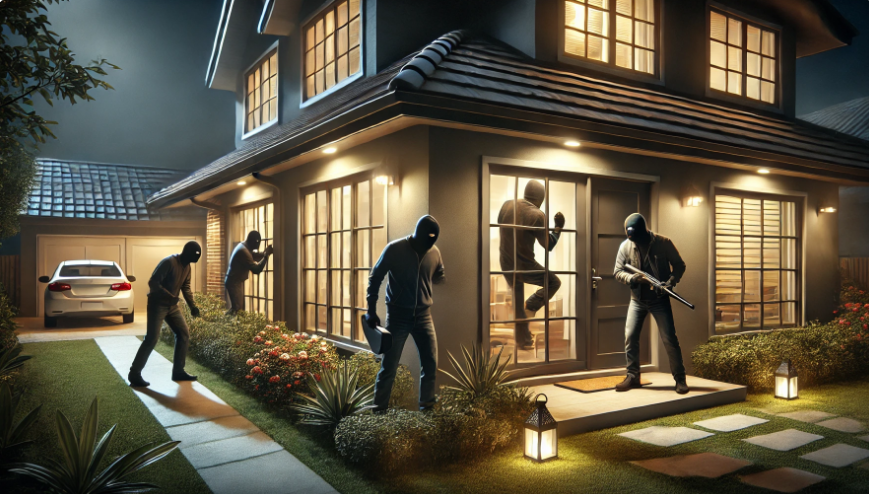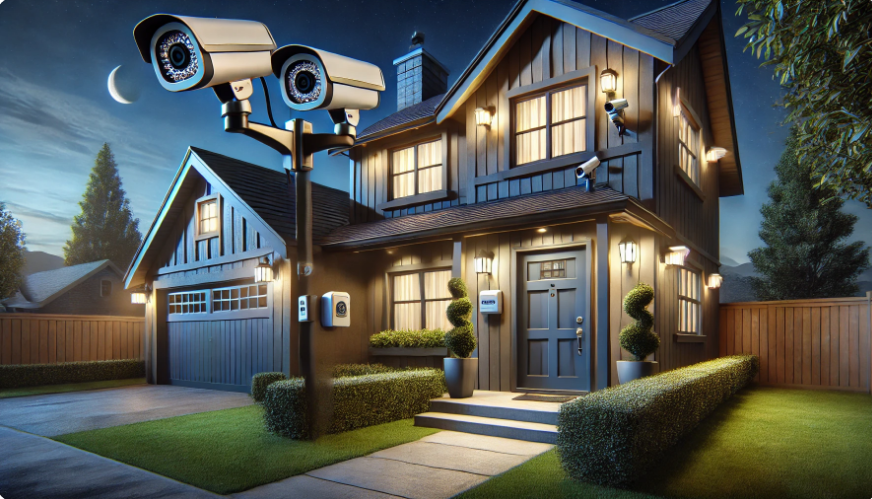- Home
- Home Invasion
How to Avoid Home Invasions
A Complete Guide to Protecting Your Castle
Want to avoid home invasions? Let's get real about protecting your home and family from unwanted visitors. With a home invasion happening every 15 seconds in America, this isn't just paranoia – it's smart preparation. I'll share exactly what I've learned about keeping the bad guys out and your family safe.
My wife and I suffered a very brutal and bloody home invasion several years ago. We were tied up and beaten. The armed criminals robbed everything of value from our remotely located home. We were each left with severe PTSD. Please use this valuable information so you can avoid what happened to us.
Understanding the Home Invasion Threat
Home invasions aren't random. Criminals typically case neighborhoods looking for easy targets. They want the path of least resistance – houses that look vulnerable and unprotected. This isn't about living in fear; it's about being smart and proactive.
When Do Home Invasions Usually Happen?
Here's something that might surprise you: most break-ins happen between 10 AM and 3 PM. Why? Because that's when most people are at work. However, the scariest ones – targeted invasions – often happen at night when families are home. Knowing this helps us prepare better.
Creating Your Home's First Line of Defense
Think of your home security like an onion – you want multiple layers that a criminal has to get through. Let's start from the outside and work our way in.
Exterior Security Measures to Avoid Home Invasions
The goal is to make your house look like too much trouble. Here's how:
- Install motion-activated solar lights around your property
- Keep bushes and trees trimmed (criminals love hiding spots)
- Put up visible security cameras (even fake ones can help)
- Display security system signs (whether you have one or not)
- Install a driveway alarm to alert you when someone enters your property
Strengthening Entry Points
Your doors and windows are your castle's weak points. Here's how to reinforce them:
- Replace short screws in door hinges with 3.5-inch wood screws
- Install solid core or metal-clad exterior doors
- Add secondary locks to sliding doors and windows
- Use window security film to prevent easy break-ins
- Install door jammers on exterior doors
Smart Home Security Technology
Technology is your friend when it comes to avoiding home invasions. But you don't need to break the bank.
Essential Security Gadgets:
- Wireless security cameras with smartphone alerts
- Video doorbells to screen visitors
- Glass break sensors for windows
- Motion detectors inside and outside
- Smart lighting systems that simulate occupancy
Creating a Home Defense Plan
Having cool gadgets isn't enough – you need a plan. Here's what to consider:
Family Communication and Meeting Points:
- Establish a safe room where family members can gather
- Create a simple communication system (texts work great)
- Have emergency contact numbers readily available
- Practice your plan regularly (just like fire drills)
Tactical Preparation
Keep these items easily accessible in a secure location:
- Flashlights (multiple, with fresh batteries)
- Cell phone charger
- Basic self-defense tools
- First aid kit
- Emergency contact list
Daily Habits to Avoid Home Invasions
Small daily habits can make a huge difference in preventing home invasions:
Morning Routine:
- Double-check all doors and windows are locked
- Ensure security cameras are working
- Close garage doors completely
- Don't leave tools or ladders outside
Evening Routine:
- Turn on exterior lights
- Lock all doors, including the one between garage and house
- Activate security system
- Close all curtains and blinds
What Not to Do: Common Security Mistakes
Let's talk about what makes your house an easy target:
Social Media Mistakes:
- Posting vacation photos while still away
- Showing off expensive purchases
- Sharing your daily routine publicly
- Checking in at locations far from home
Physical Security Mistakes:
- Hiding keys under doormats or rocks
- Leaving garage doors open
- Neglecting to maintain exterior lighting
- Failing to lock windows on nice days
Community-Based Security Measures
Your neighbors can be your best security asset. Here's how to leverage community:
Building a Neighborhood Watch:
- Get to know your neighbors
- Create a neighborhood text group
- Share security concerns and suspicious activities
- Watch each other's houses during vacations
Special Considerations for Different Living Situations
Apartment Living:
- Install additional locks (with landlord permission)
- Use door stops and window locks
- Know your neighbors
- Be extra careful about who you let in
Rural Homes:
- Install perimeter lighting
- Use driveway alerts
- Consider getting a dog
- Have backup communication methods
Emergency Response Plan
If despite everything, someone tries to break in:
Immediate Actions:
- Get to your safe room
- Call 911
- Stay quiet and calm
- Follow your practiced family plan
After an Attempt:
- Document everything
- File a police report
- Review and upgrade security measures
- Share information with neighbors
Travel Precautions
When you're away:
- Use light timers
- Stop mail/package delivery
- Ask neighbors to watch house
- Maintain yard care
- Don't broadcast travel plans
Conclusion:
Remember, avoiding home invasions isn't about living in fear – it's about being prepared and making smart choices. By implementing these layers of security and maintaining good habits, you're making your home a hard target that criminals are likely to skip. Start with the basics, build up your defenses over time, and always keep your family's safety as the top priority. The best home invasion is the one that never happens because you were prepared.
More reading:
Be sure to check out the "vital details" of our new
Survival Intelligence Blackfile.



























